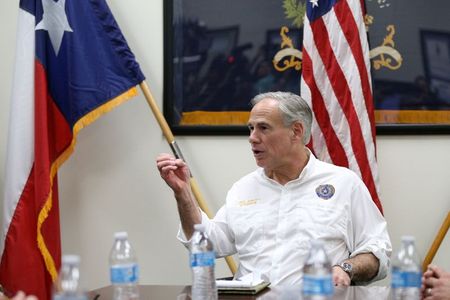By Joseph Ax and Julia Harte
(Reuters) – Texas Governor Greg Abbott’s decision to bar private companies from enforcing COVID-19 vaccine mandates is the latest sign he is betting the state’s electorate remains solidly Republican ahead of his re-election bid next year.
In recent months, Abbott has backed a series of measures that have pulled Texas sharply to the right, including the country’s most restrictive abortion ban, a raft of voting limits, an effort to fund a border wall, restrictions on transgender student athletes and expanded gun rights.
His executive order on Monday banning private employers and other entities from imposing COVID-19 vaccine mandates is in direct conflict https://www.reuters.com/business/healthcare-pharmaceuticals/texas-vaccine-mandate-ban-likely-be-trumped-by-federal-law-could-cause-2021-10-13 with the Biden administration’s plan to require shots for workers.
Democrats have made political gains in Texas on the strength of rapidly growing metropolitan areas such as Houston and Austin. But with the two-term governor facing a pair of intraparty challengers in a March primary, Abbott’s moves appear aimed at energizing the Republican base rather than appealing to swing voters and moderate Democrats.
“He’s taking a more aggressive approach,” said Brendan Steinhauser, a Texas-based Republican political consultant. “These are all ways to shore up conservative voters in the state.”
There is evidence to suggest the strategy is sound. Last year, former President Donald Trump carried Texas by more than five percentage points, despite national unpopularity and unprecedented Democratic fervor.
Abbott, 63, is likely to face a far friendlier environment in 2022 as he seeks another four-year term. The party that controls the White House typically suffers losses in its first midterm election, and President Joe Biden, a Democrat, has already seen his approval ratings falter.
“I do strongly believe Governor Abbott is in the catbird seat for re-election,” said Ray Sullivan, who was a senior adviser to Republican former Texas Governor Rick Perry. “History is against the Democrats this cycle.”
No Democrat has announced a run for Abbott’s office next year. Most political observers expect Beto O’Rourke, the former congressman and presidential candidate who has proven fundraising muscle, to throw his hat in the ring.
Abbott is facing at least two credible Republican rivals for the first time in his tenure: Don Huffines, a former state senator, and Allen West, chairman of the Texas Republican Party who was recently hospitalized with COVID-19.
Both say Abbott is not conservative enough for Texas. Huffines took credit for Abbott’s vaccine mandates ban on Monday, tweeting that he was “glad Greg Abbott is finally caving to the grassroots pressure brought by my campaign.”
Abbott’s campaign did not respond to a request for comment.
CONSERVATIVE BONA FIDES
Abbott has occasionally angered his party’s right wing, such as last year when, early in the coronavirus pandemic, he issued a statewide mask order. That stands in contrast to his decision this summer to prohibit schools from requiring masks.
With Biden serving as a convenient political foil in the White House, Abbott can focus on re-establishing his conservative bona fides. Abbott has already made the president a frequent target, picking fights with the administration on everything from border security to mask mandates to abortion.
“By and large, Abbott’s thinking right now first and foremost about the March 2022 Republican primary,” said Mark Jones, a political science professor at Rice University in Houston.
Mustafa Tameez, a Texas-based Democratic strategist, said Abbott is doing what many other Republican leaders have done: demonstrating his fealty to Trump. Last month, Abbott defended his state’s partial review of the 2020 presidential election, a decision announced hours after Trump called on Republicans to “audit” the results even though he carried the state.
Tameez said he understood the argument that Texas Republicans hold an edge in midterm elections, in part because turnout tends to be lower among Democrats. But he noted that turnout has exploded in recent cycles and warned that Abbott could pay a price for pursuing far-right priorities.
“If Governor Abbott and the Republican Party continue to go to their extreme agenda… they will lose the suburbs of Texas and therefore will lose elections – sooner than they believe,” he said.
A poll conducted by the Texas Politics Project at the University of Texas in August showed a majority of Texans feel the state is headed in the wrong direction, the worst assessment since the poll began in 2008. It gave Abbott his lowest approval rating since he took office in 2015.
Some of Abbott’s drop in approval can be attributed to his more aggressive partisan stances of the past year. But it was also part of a general decline in support for political leaders over the same period, said James Henson, who directs the polling project.
Even if Abbott’s policies have alienated some independents and Democrats, consolidating his conservative base is a strategic way to prepare for next year’s elections, Henson said.
“He knows that Trump is not going to be on the ticket in 2022, which would get Democratic voters more fired up,” said Nate Lerner, a Democratic consultant who helped run a grassroots effort to convince O’Rourke to run for the White House in 2020. “The middle is so tiny and small, it’s become more about base turnout.”
(Reporting by Joseph Ax and Julia Harte; Editing by Colleen Jenkins and Bill Berkrot)





